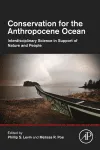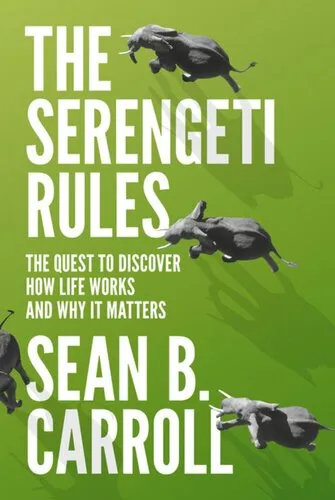Conservation for the Anthropocene Ocean. Interdisciplinary Science in Support of Nature and People
4.5
Reviews from our users

You Can Ask your questions from this book's AI after Login
Each download or ask from book AI costs 2 points. To earn more free points, please visit the Points Guide Page and complete some valuable actions.Related Refrences:
Introduction to "Conservation for the Anthropocene Ocean: Interdisciplinary Science in Support of Nature and People"
The Anthropocene—the current geological epoch characterized by significant human impact on Earth's ecosystems—is a defining moment for the health of our planet's oceans. As the complex interplay between nature and society shapes marine environments, effective conservation strategies must integrate interdisciplinary approaches to address this challenge. Conservation for the Anthropocene Ocean: Interdisciplinary Science in Support of Nature and People is a groundbreaking work that explores the critical intersections of science, policy, and human well-being in safeguarding our oceans. Edited by Phillip Levin and Melissa R. Poe, this book assembles a wealth of diverse perspectives from experts across multiple fields, offering innovative solutions grounded in actionable science.
The publication aims to reimagine traditional conservation practices by emphasizing the importance of considering both ecological and sociocultural dimensions. By balancing the interests of marine ecosystems with the needs and aspirations of human communities, this book provides an inclusive framework for decision-makers and practitioners who seek sustainable outcomes for the oceans. Here, you'll find not only a comprehensive overview of oceanic challenges but also a call for collaboration and adaptive management strategies to confront the ever-evolving problems of the Anthropocene era.
Detailed Summary of the Book
Conservation for the Anthropocene Ocean spans several topics critical to modern ocean conservation. The book delves into the myriad pressures faced by marine ecosystems, including climate change, overfishing, pollution, habitat destruction, and the socio-economic dynamics driving these issues. It emphasizes the importance of solutions that prioritize more than just biodiversity; solutions must also address human livelihoods, cultural values, and equity among communities affected by conservation policies.
The editors have organized the book into sections that integrate ecological science, social science, and policy analysis. Contributors provide case studies from around the world, highlighting successful conservation initiatives and the challenges encountered along the way. The central theme revolves around embracing complexity—acknowledging that marine conservation is not a one-size-fits-all endeavor but rather a process that requires localized solutions informed by global knowledge.
Additionally, the book introduces cutting-edge tools and methodologies, from co-designing conservation policies with stakeholders to leveraging big data for ecosystem monitoring. These insights pave the way for an inclusive, adaptive, and collaborative approach to marine conservation.
Key Takeaways
- Modern conservation must address both ecological and human dimensions to be successful.
- Interdisciplinary collaboration is essential for tackling the complex challenges of the Anthropocene.
- Adaptive management allows conservation efforts to respond dynamically to emerging data and changing conditions.
- Case studies provide valuable lessons about what works and what doesn’t in real-world conservation contexts.
- Sustainable conservation requires inclusive decision-making processes that respect the rights and voices of all stakeholders, including marginalized populations.
Famous Quotes from the Book
"Conservation is no longer about wilderness alone; it is about the spaces where human activity and the natural world collide." - Phillip Levin
"By recognizing the interconnectedness of people and the ocean, we can design solutions that are not just beneficial for ecosystems but also sustainable for communities." - Melissa R. Poe
"The Anthropocene compels us to view conservation through a different lens—one that bridges science, policy, and society for a healthier, more resilient ocean." - Contributing Author
Why This Book Matters
The ocean is the lifeblood of our planet. It regulates the climate, provides food for billions, and supports countless species. Yet, human activities have placed unprecedented stress on marine systems. This book matters because it redefines how we approach conservation in this critical era. It advocates for a holistic perspective, where science meets people, and solutions are designed to be equitable and enduring.
Its interdisciplinary focus ensures that no single perspective dominates the conversation, creating a platform where scientists, policymakers, activists, and local communities can come together. By adopting this comprehensive approach, Conservation for the Anthropocene Ocean is not just a reference for researchers and practitioners; it's a manifesto for anyone who cares deeply about the future of our planet's oceans and the people who depend on them.
As the challenges of the Anthropocene continue to grow, this book serves as both a guide and an inspiration. It presents a vision of hope—a future where human ingenuity and collaboration can forge a path toward sustainable coexistence with our ocean ecosystems.
Free Direct Download
You Can Download this book after Login
Accessing books through legal platforms and public libraries not only supports the rights of authors and publishers but also contributes to the sustainability of reading culture. Before downloading, please take a moment to consider these options.
Find this book on other platforms:
WorldCat helps you find books in libraries worldwide.
See ratings, reviews, and discussions on Goodreads.
Find and buy rare or used books on AbeBooks.
1362
بازدید4.5
امتیاز0
نظر98%
رضایتReviews:
4.5
Based on 0 users review
Questions & Answers
Ask questions about this book or help others by answering
No questions yet. Be the first to ask!












